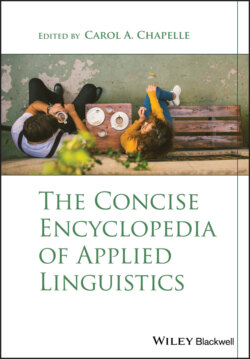Читать книгу The Concise Encyclopedia of Applied Linguistics - Carol A. Chapelle - Страница 194
Foreign Languages: Global English
ОглавлениеEducation departments the world over are attaching increasing importance to the implementation of bilingual programs in foreign languages, since there is a widespread desire to educate multilingual and multicultural citizens in a context where the linguistic consequences of globalization are more and more evident. Consequently, an ever‐increasing number of schools and universities are offering courses taught in foreign languages, exposing students to teaching through the medium of a foreign language. Since World War II, a global trend has seen English gain importance and replace other foreign languages. In most parts of the world when bilingual education includes the English language, there is generally a consensus support for bilingual education—this is not always the case if the language concerned is a minority language.
In fact, many fear that this hegemony of English will make people lazy about learning other languages or simply make all the other languages unnecessary; it may also hasten the disappearance of minority languages and could cause widespread language death. The study carried out by Dörnyei, Csizér, and Németh (2006) highlights this. These authors examined motivation and language attitudes among 13,000 teenage language learners on three successive occasions (1993, 1999, and 2004). The objective was to describe the impact of sociopolitical changes on the various language attitudes prevailing among Hungarian students and their motivation to learn five foreign languages: English, German, Italian, French, and Russian. The authors state that, despite having a small country as their target, the results are not confined to Hungary but have worldwide implications, as their data can provide valuable information into the actual operation of language globalization.
There was a consistent rank order of the five target languages in the three survey phases, in which English always appeared at the top and Russian at the bottom of the participants' preferences. However, the most outstanding finding was the general decline over time. While English maintained its high educational profile, the remaining languages became less and less appreciated. The authors conclude that the learning of languages other than English is impeded by what they label as the “Englishization” process.
